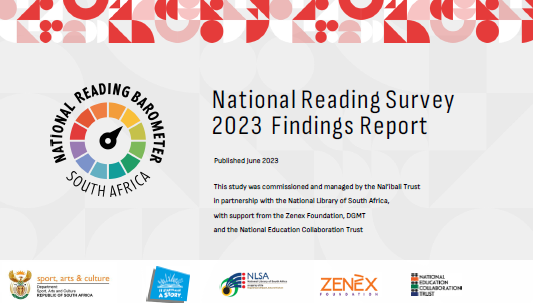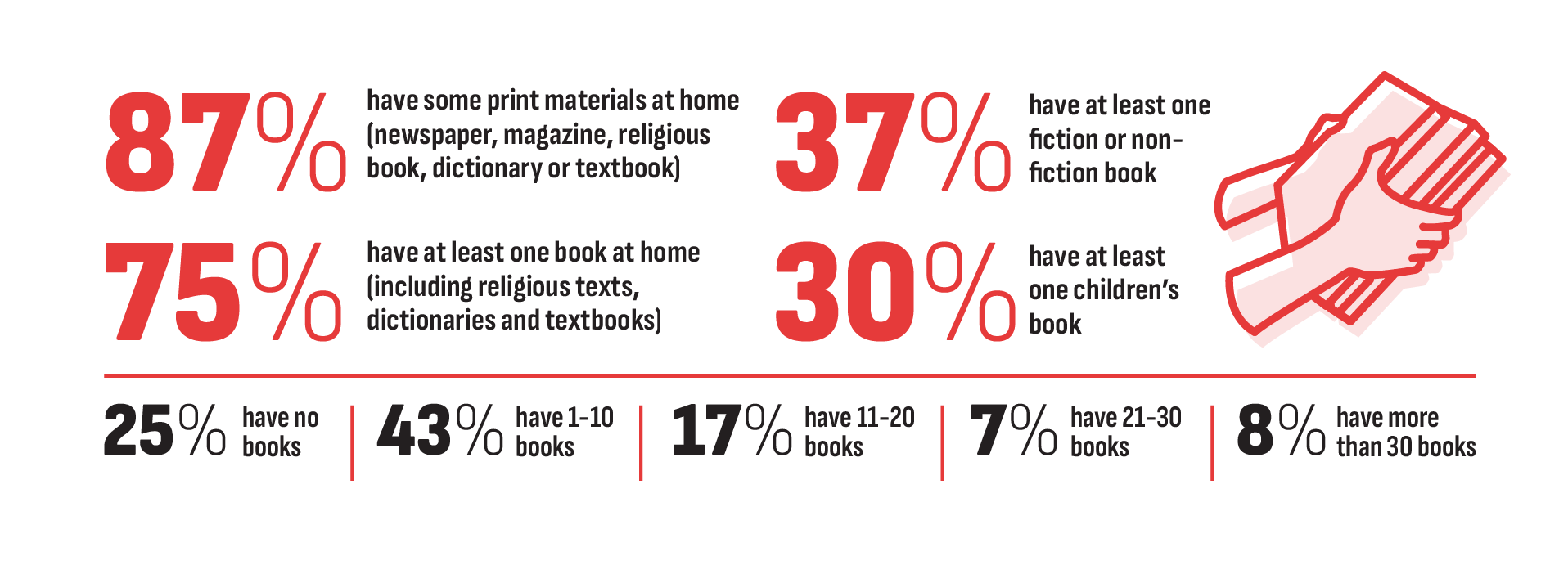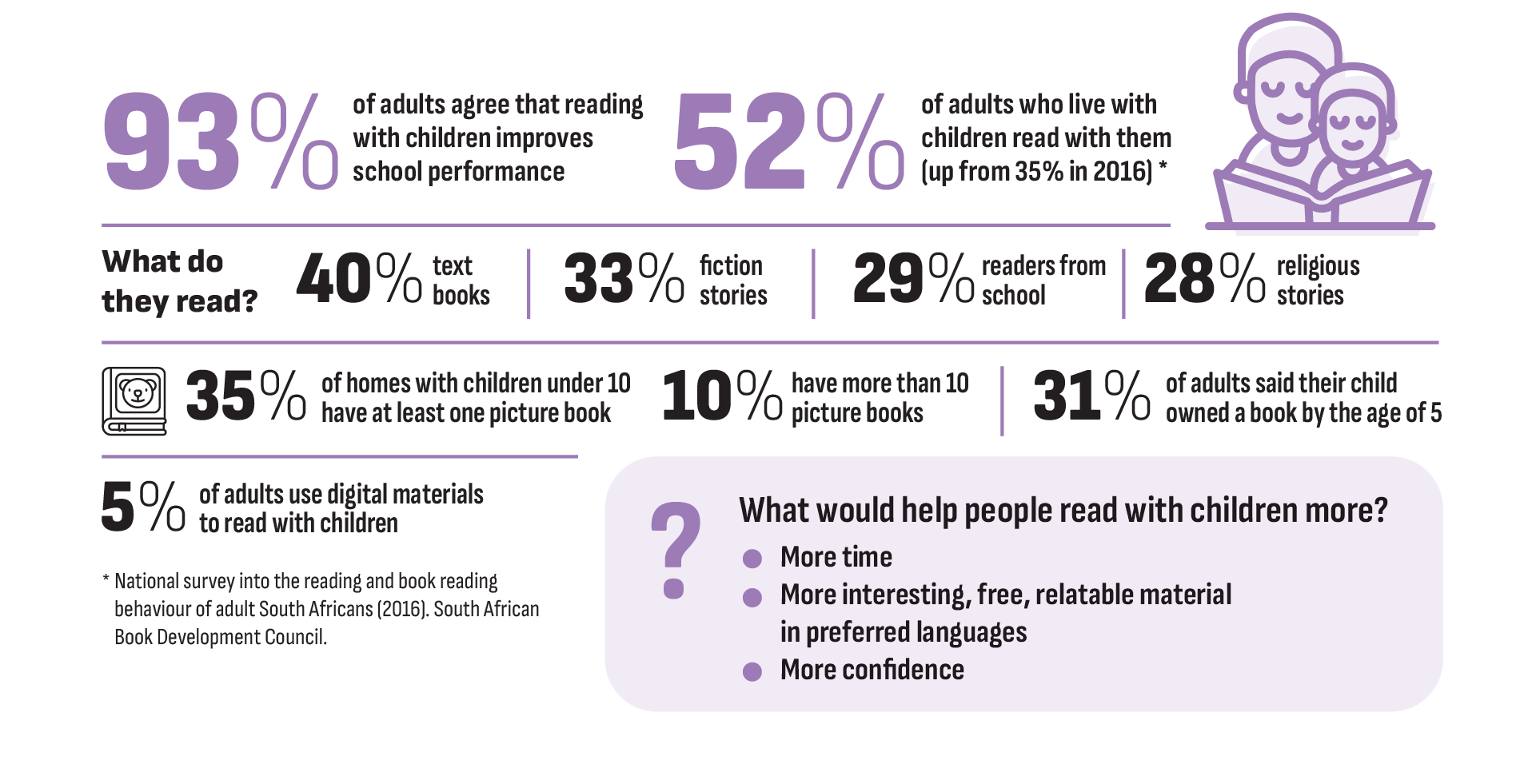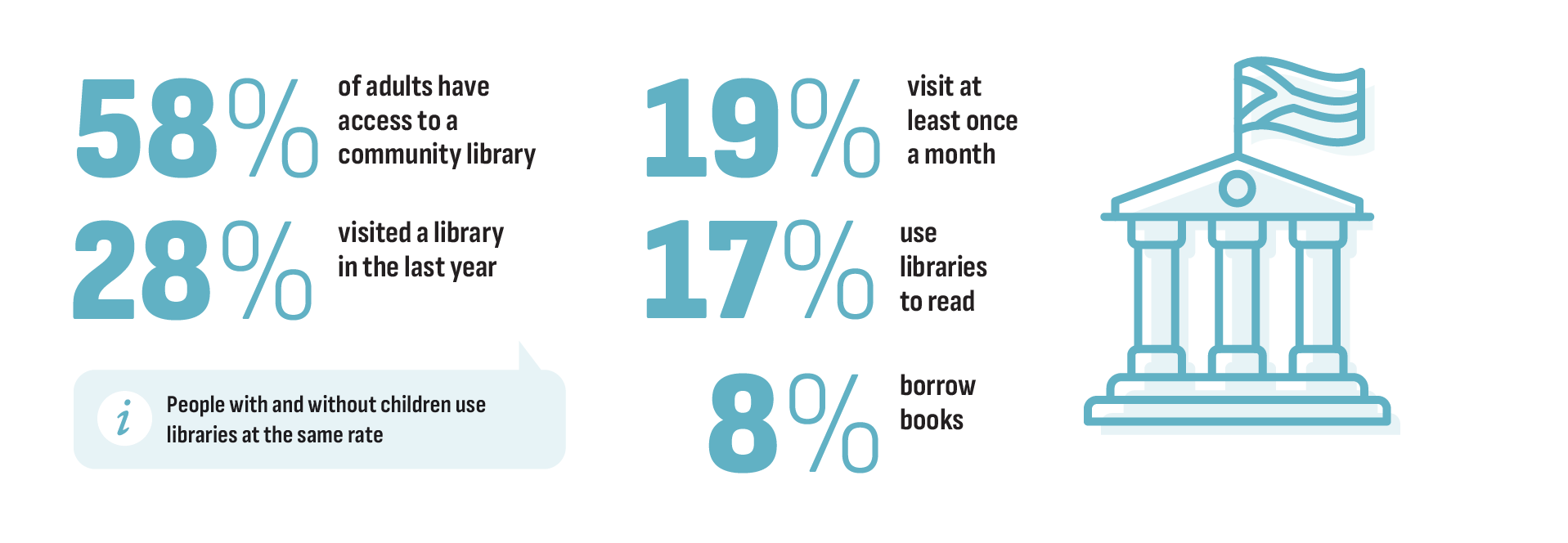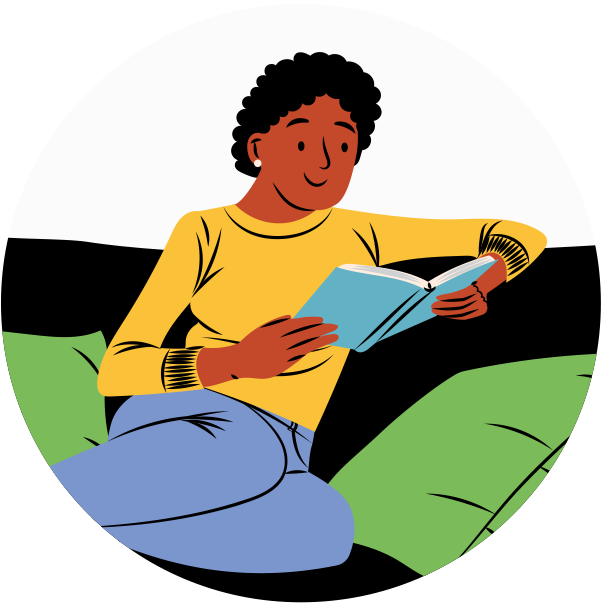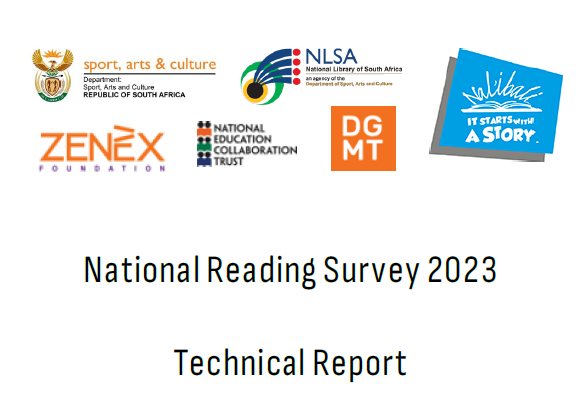Introduction
The National Reading Survey describes the reading practices, preferences and contexts of adults, both in terms of reading for themselves and reading with children in their household.
The survey covers:
What and how much people read
Attitudes/motivations related to reading
Digital reading
Reading language preferences
Key Findings
Access to reading materials
Reading materials access is improving, but most households still have few books.
Reading practices
Most South Africans read, but only a third read long texts often.

Reading with children
Reading with children is increasing, but very few homes have >10 picture books, and most parents prefer print materials.
Digital reading
Digital reading is growing, but access remains unequal.
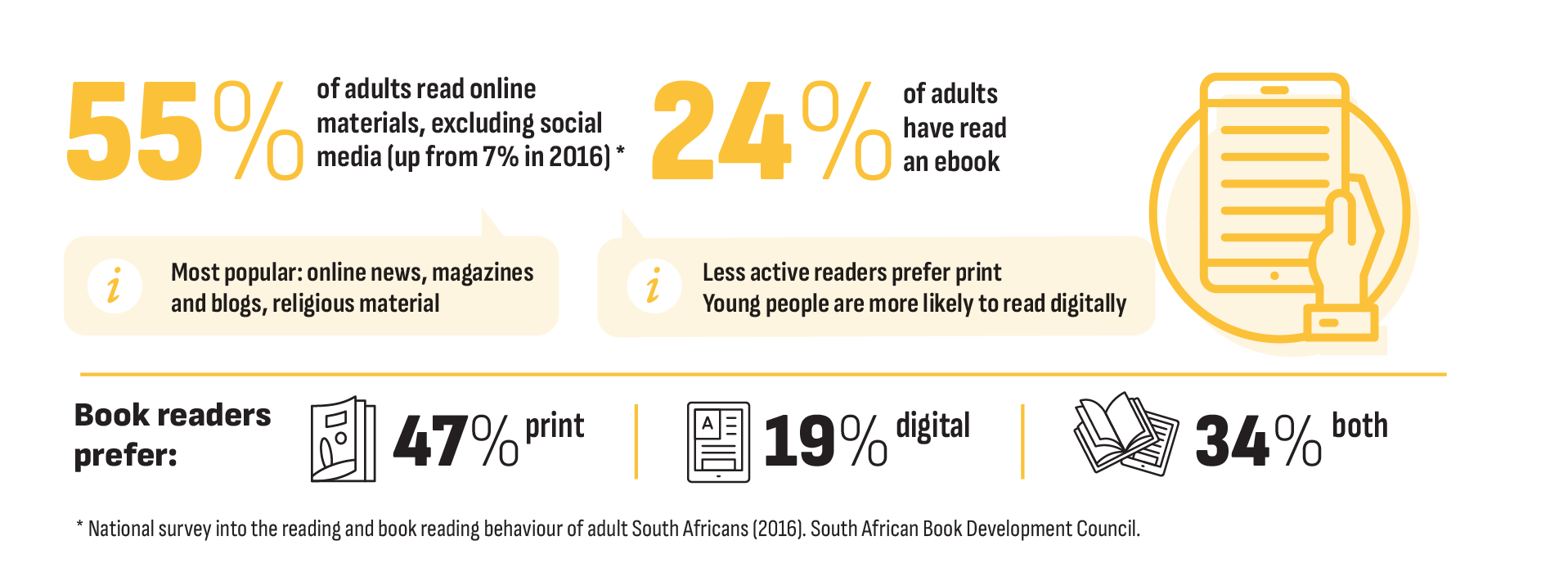
Languages
South Africans are multilingual readers, but not enough texts are available.
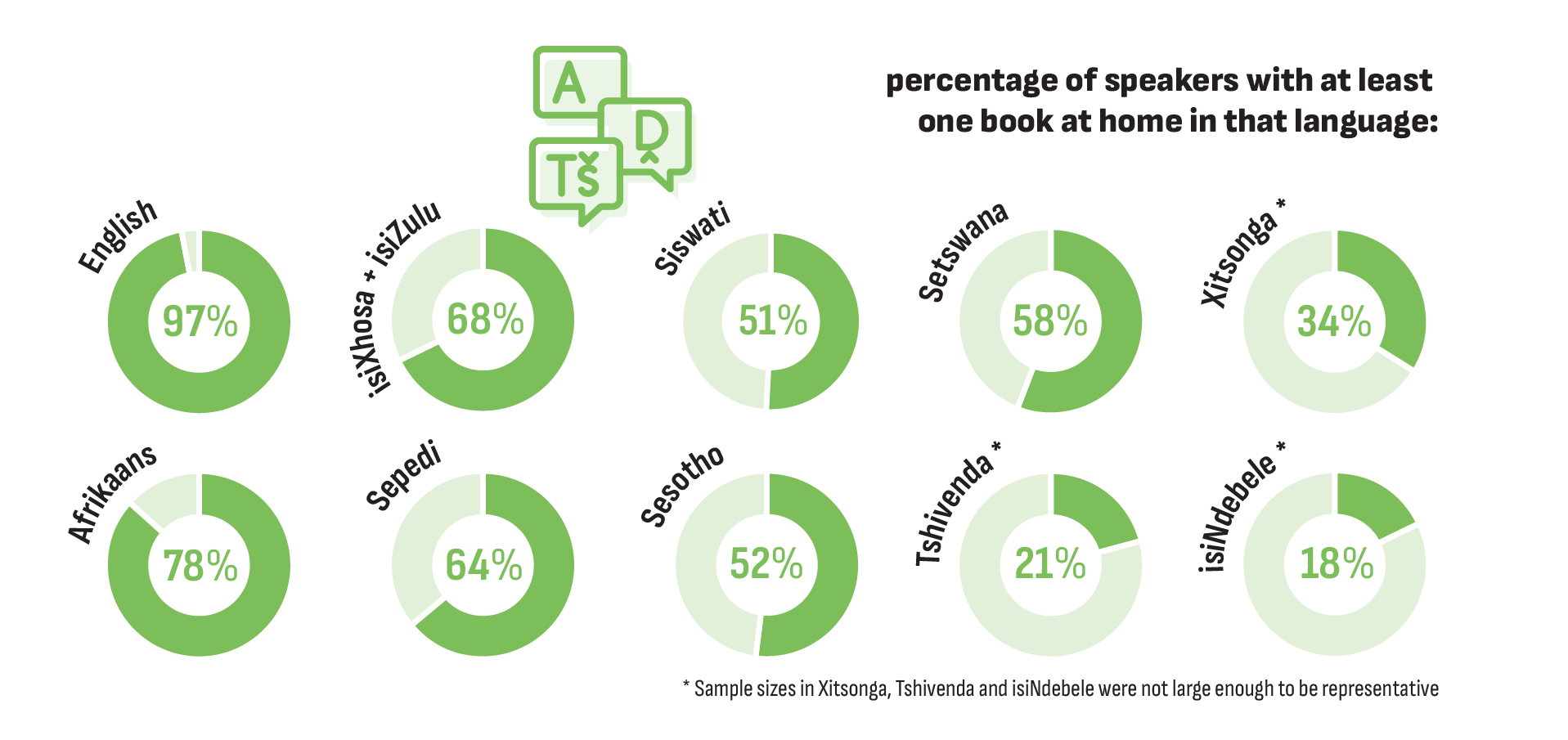
Personas
There is not one right way to read: people read for different reasons and in different ways. The National Reading Survey set out to describe and understand the diverse ways that South Africans actually read. It built six multi-indicator indices to analyse key dimensions of reading:
Reading Purpose
why you read: enjoyment, information, communication
Reading Habits
how regularly you read
Reading Volume
how much time you spend reading
Reading Depth
what length of texts and depth of content you read
Reading Motivation and Identity
the extent to which you value reading and consider yourself to be ‘a reader’
Reading Materials Access
what you read, including the number, types and diversity of reading materials you engage with and any barriers you face to accessing the materials you prefer to read
When we analysed and clustered the data along these indices, five distinct reading cultures emerged, which are represented as “Reader Personas.” Although structural inequality influences access to reading materials and other opportunities, each Persona that emerged from the data included people from across South Africa’s diverse and unequal society.
The Personas can help people working in reading promotion to understand different audiences - beyond traditional markers such as class, education level, race or location - and develop targeted messaging and strategies to encourage more reading within each of these groups.
Reading Personas
18% of South African adults
"Reading is valuable, but it’s not for me."
Targeted messaging: find opportunities to tell and listen to stories; motivate young people to read.
Nonreaders might be able to read a little, but they rarely do. If something has to be read, they will usually get someone else to read it to them. They have very little printed reading material at home, but some may have religious books. They rarely use the internet, and while they have access to mobile phones these are unlikely to be internet-enabled. They are typically older (retirement age), not economically active or unemployed and have had less opportunity for education. They do not identify as readers. Still, they see the value in reading and are positive about children learning to read.
17% of South African adults
“I read when I have to.”
Targeted messaging: believe that you are a reader and value the reading you are already doing; find a topic or an author that excites you.
Functional Readers are people who can read but really only read when they have to. They do read short messages for communication and might have internet access but rarely spend much time on social media. They own very few physical books (apart from religious books) and very few e-books, even when they have internet access. They rarely use their mobile devices to read for pleasure, but sometimes use them for getting information they need. They prefer to read on paper. They identify as aspiring or occasional readers.
23% of South African adults
“I read but it's not a big part of my life."
Targeted messaging: find a topic or an author that excites you; make reading more of a habit.
Occasional Readers read a little bit of everything but not too much of anything. They frequently read for communication, but also read regularly for both information and enjoyment. Most own a few books, but they usually have less than 10. A few read long texts regularly, but most do so rarely. Most have internet access and are comfortable with digital reading, but still prefer to read on paper. They enjoy reading fiction, non-fiction, news and magazines but rarely visit the library. They mostly identify as occasional readers.
26% of South African adults
“I read to stay connected and know what's happening.”
Targeted messaging: share your favourite reads with others; try longer texts.
Regular Readers are the group that reads the second most. They read very frequently to communicate, for information and for enjoyment. They are likely to own more than 10 books, generally have access to the internet and smartphones and are digitally active, including spending a lot of time on social media, but they rarely read e-books. They often read on mobile devices, both for enjoyment and for information, but about half prefer reading on paper. They enjoy reading a variety of materials and visit libraries regularly. They read long texts, but do so less frequently than committed readers. They identify strongly as regular or passionate readers.
17% of South African adults
"I love reading and it's part of my everyday life."
Targeted messaging: share your favourite reads with others; influence people in your social circles to read.
Committed Readers are the group that reads the most. They spend most of their days reading for information and to communicate as part of studying, working or looking for work and also choose to read for enjoyment almost daily. They enjoy a diverse range of content, are likely to own more than 10 books, including both e-books and physical books, and regularly access books through libraries. They all have access to the internet and smartphones. They read equally on paper and digitally. They identify strongly as regular or passionate readers.

